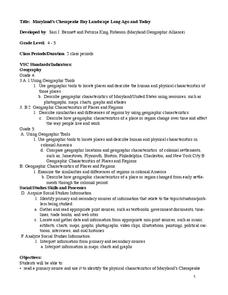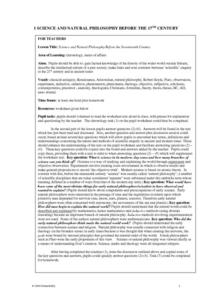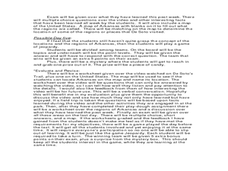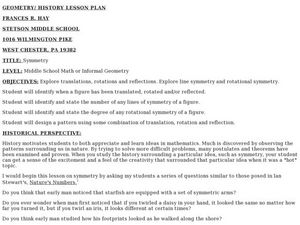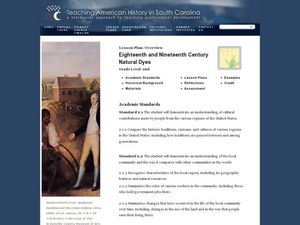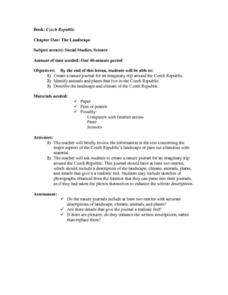Curated OER
Does Mother Nature Know Best?
Investigate herbal medicine in the science or health classroom with this instructional activity from the New York Times. After a discussion about class members beliefs about and experiences with herbal medicines, pupils read an...
Annenberg Foundation
Teaching Geography: Workshop 4—North Africa/Southwest Asia
Can Jerusalem be equitably organized? Can Israel and Palestine be successfully partitioned? Part one of a two-part workshop looks at the geo-political history of Jerusalem while Part two investigates Egypt's dependence of the Nile River...
Curated OER
Western Civilizations, Chapter 16: Scientific Revolution
Engage your historians in the Scientific Revolution with a collection of interactive tools. This section outlines the Scientific Revolution and its significance within the context of the Renaissance. Scholars use the Chrono-Sequencer to...
Curated OER
Maryland’s Chesapeake Bay Landscape Long Ago and Today
Combine a fantastic review of primary source analysis with a study of Captain John Smith's influence on the Chesapeake Bay region in the seventeenth century. Your young historians will use images, a primary source excerpt, and maps...
National Museum of the American Indian
The Kwakwaka'Wakw: A Study of a North Pacific Coast People and the Potlatch
Discover the cultural practices and unique value systems of a group of native peoples from Canada called the Kwakwaka'wakw. Your young historians will discuss how conceptions of wealth can vary and how these native...
Tennessee Valley Authority
Renewable Energy Sources
Not all energy sources are renewable, as learners investigate in this unit. Made up of six lessons that span a few weeks of instruction, the unit has learners examining US energy reserves and consumption, using data to draw conclusions...
Elizabeth Murray Project
The Education of Women in Colonial America
What educational opportunities were available to women during the colonial era in American history? How did the opportunities available to women differ from those for men? To answer this question, class members examine a series of...
Reading Through History
Anti-Federalist Paper No. 47
The path to a more perfect union was rockier than most history books would lead you to believe. Young historians read “Antifederalist No. 47,” written by James Madison (under the pen name “Centinel”), which sharply criticizes the...
Stanford University
Chinese Immigration and Exclusion
The Chinese Exclusion Act was the first race-based restriction on immigration in American history. Why was the act passed after Chinese immigrants helped build the Transcontinental Railroad? A series of documents, including speeches and...
Curated OER
Pocumtucks in Deerfield
As part of a study of colonial and Native American history, class members focus on the beliefs and land use of the Pocumtucks, who settled near Deerfield, Massachusetts. Learners examine their beliefs about land use and ownership, the...
Curated OER
Energy Through the Ages
In this energy through the ages activity, students read about the history of energy use beginning with early civilization and the use of water wheels for the production of energy to hydrocarbon-based coal, oil and natural gas of today....
Howard Hughes Medical Institute
Ebola: Disease Detectives
How did the Ebola virus first infect humans? Young virologists examine genetic sequences from the 2014 Sierra Leone outbreak to find similarities during a riveting activity. Following similar methods used by MIT and Harvard, partners...
Facts and Files
The Nile
While it may not be possible to take an entire class to Egypt and explore the ancient wonders, it is possible to engage your young historians in activities that ask them to research these and other antiquities and place them on their...
Curated OER
Science and Natural Philosophy Before the Seventeenth Century
Students complete a worksheet about some of the natural philosophers in history. They use graph paper and create a timeline with the dates of birth and names of a list of natural philosophers. They list four questions concerning life and...
Curated OER
The Wilderness Concept: Our National Parks, History and Issues
Young scholars examine the history of the National parks. In groups, they discuss the concepts of conservation and preservation. They discuss the use of natural resources and how some are renewable and non-renewable. To end the activity,...
Curated OER
Arkansas History Lesson Plant One: Play-Do Soto
Fifth graders complete a variety of projects to learn about Arkansas history. In this Arkansas lesson plan, 5th graders go on a field trip to a state park, explore an Arkansas map, put play-dough on the trail of De Soto, color regions of...
Curated OER
Geometry History Lesson
Tenth graders investigate the early history of geometry. In this geometry lesson, 10th graders investigate translations, rotations, and reflections. They also solve problems with line of symmetry and rotational symmetry while reviewing...
Curated OER
Interpreting History With Artifacts: Mid to Late 1800s
Fourth graders study history though the exploration of artifacts. In this Civil War lesson, 4th graders examine artifacts such as sweet grass basket, spinning top, photos on tin, cast iron kettle, china"bone plate," bonnet, wooden carved...
Curated OER
Eighteenth and Nineteenth Century Natural Dyes
Second graders explore the work of Americans when it came to coloring materials. In this interdisciplinary instructional activity, 2nd graders follow the provided steps to make natural goldenrod dye from scratch.
Curated OER
AIDS: A Pop Culture History
Students watch the documentary AIDS: A Pop Culture History and discuss the issues the documentary raises. Students discuss the different facts and myths about AIDS, discuss stereotypes in relation to the disease and discuss common fears...
Curated OER
State History Acting and Podcasting
Students participate in a play. In this historical figures lesson, students choose a person from history and take on their role. Students research the character, create historically accurate costumes and work in groups to prepare a...
Curated OER
Nature Notes
Learners spend some time outdoors and record their observations of abiotic conditions, geologic surroundings and living organisms. They reflect and write about the experience of being observant in nature.
Curated OER
Social Studies: Czech Republic Nature Journals
Students create nature journals of imaginary trips to the Czech Republic. Included in their reports are information and descriptions of the landscape, climate, animals, plants, and elements to create a realistic impression. From the...
Curated OER
How Has African American Culture Shaped the History of Kentucky?
Eleventh graders explore the African American culture and history of Kentucky. They observe how an author's personal bias can define the argument of his/her publication. Students analyze primary source documents.
Other popular searches
- Museum of Natural History
- Australia Natural History
- Natural History Writers
- Natural History of Hawaii
- Natural History Museums
- Australian Natural History
- Natural History Yosemite
- Ancient Natural World





